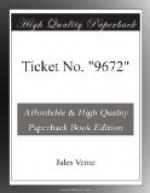“And though the writing gives no clew to the scene of the catastrophe,” he said to himself, “we at least know where the bottle was picked up. This letter does not state, but they must know at the Naval Department; and is it not an indication that might be used to advantage? By studying the direction of the currents and of the prevailing winds at the time of the shipwreck might it not be possible? I am certainly going to write again. Search must be made, no matter how small the chances of success. No; I will never desert poor Hulda! And until I have positive proofs of it I will never credit the death of her betrothed.”
Sylvius Hogg reasoned thus; but at the same time he resolved to say nothing about the measures he intended to adopt, or the search he intended to urge on with all his influence. Hulda and her brother must know nothing about his writing to Christiania; moreover, he resolved to postpone indefinitely the departure which had been announced for the next day, or rather he would leave in a few days, but only for a trip to Bergen. There, he could learn from the Messrs. Help all the particulars concerning the “Viking,” ask the opinion of the most experienced mariners, and decide upon the way in which search could best be made.
In the meantime, from information furnished by the Navy Department, the press of Christiania, then that of Norway, Sweden, and finally all Europe, gradually got hold of this story of a lottery ticket transformed into an important legal document. There was something very touching about this gift from a shipwrecked mariner to his betrothed.
The oldest of the Norwegian journals, the “Morgen-Blad,” was the first to relate the story of the “Viking” and Ole Kamp; and of the thirty-seven other papers published in that country at the time, not one failed to allude to it in touching terms. The illustrated “Nyhedsblad” published an ideal picture of the shipwreck. There was the sinking “Viking,” with tattered sails and hull partially destroyed, about to disappear beneath the waves. Ole stood in the bow throwing the bottle containing his last message into the sea, at the same time commending his soul to God. In a luminous cloud in the dim distance a wave deposited the bottle at the feet of his betrothed. The whole picture was upon an enlarged representation of a lottery ticket bearing the number 9672 in bold relief. An unpretending conception, unquestionably, but one that could hardly fail to be regarded as a masterpiece in the land which still clings to legends of the Undines and Valkyries. Then the story was republished and commented upon in France and England, and even in the United States. The story of Hulda and Ole became familiar to every one through the medium of pencil and pen. This young Norwegian girl, without knowing it, held a prominent place in the sympathy and esteem of the public. The poor child little suspected the interest she had aroused, however; besides, nothing could have diverted her mind from the loss that engrossed her every thought.




